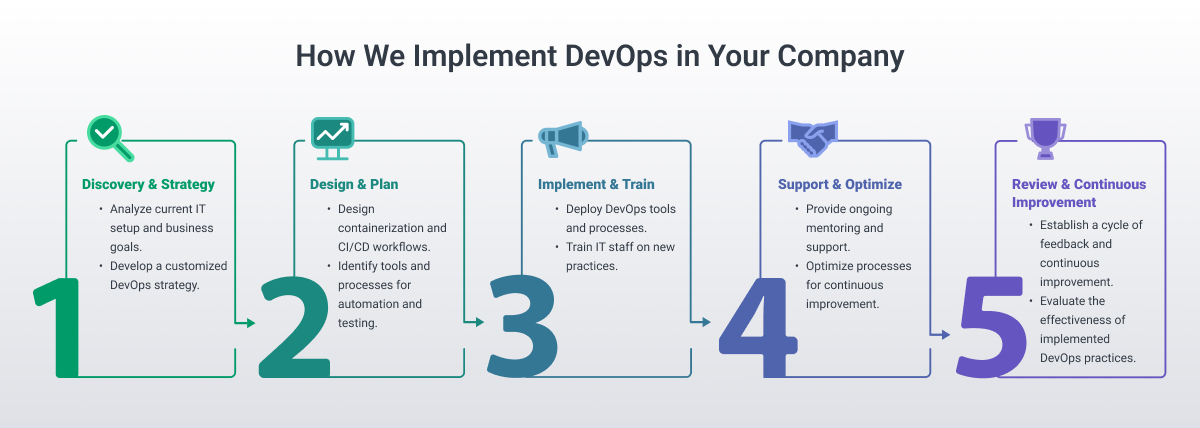Experience Unparalleled Efficiency with DevOps Outsourcing Services
DevOps outsourcing transforms your development strategy by extending your team with the expertise to automate key processes, empowering your business to deliver top-quality software more swiftly and effectively.
- Accelerated Deployments: Implement automated systems for more frequent and dependable releases.
- Enhanced Team Cooperation: Cultivate a synergistic culture between development and operations teams.
- Superior Quality: Employ continuous testing to minimize defects and increase system dependability.
- Rapid Market Introduction: Accelerate your development timeline to stay ahead of the competition.
- Cost Effectiveness: Refine operations to reduce overhead and unnecessary expenditures.
|
200Xdeployment frequency of businesses with DevOps compared to those without. |
24Xfrequency of faster recovery from failure & minimized downtime. |
22%minimized time on unplanned work and rework. |
28%reduced cloud costs with DevOps consulting. |
Scale faster with DevOps outsourcing services.
DevOps Services We Offer
We specialize in enhancing your development ecosystem by integrating state-of-the-art automation technologies, optimizing your CI/CD pipelines, and crafting a comprehensive DevOps strategy. We have all the DevOps services you need to optimize your development, automate your processes, and scale faster than ever.
Cloud Service Providers

At Softjourn, our AWS DevOps consulting draws from extensive experience and a deep understanding of AWS’s broad capabilities. We use AWS to optimize DevOps processes for agile, scalable, and efficient operations. Our expertise includes AWS-driven automation, CI/CD pipelines, and strategies for cloud-native applications, positioning us as a reliable partner for your digital transformation.

Softjourn’s Azure DevOps consulting leverages a proven track record to offer customized solutions that maximize the capabilities of Microsoft Azure. We integrate Azure’s powerful cloud services into your DevOps practices to improve operational agility and scalability. Our dedicated team ensures precise execution of your Azure projects, fostering digital innovation and growth.
Why Our Clients Love Our DevOps Outsourcing Services

Traditional divides between developers, operations, and testers often slow progress and curb innovation. Our experts excel in fostering collaboration and dismantling these barriers, boosting workflow and productivity.

Many organizations grapple with outdated technologies and disjointed systems. We streamline data integration and refactor code and infrastructure to enhance scalability and manageability.

Companies typically exceed their cloud budgets by 28% due to inefficient resource use. Through comprehensive audits, we identify wasteful spending and optimize resources to ensure cost-effectiveness.

Without proper guidance, Infrastructure as Code (IaC) can introduce inefficiencies and complicate operations. Our team assists in decluttering and implementing efficient CI/CD pipelines, making your infrastructure automation manageable and effective.

It can be difficult to measure the impact of DevOps across various teams and processes. We aid in pinpointing and tracking essential metrics to accurately assess and continuously improve your DevOps effectiveness.

As cybersecurity threats escalate, securing and maintaining compliance throughout the software development lifecycle becomes essential. Our DevSecOps practices embed security early on, mitigating risks and safeguarding your data.
Ensure your DevOps process is equipped to provide peak performance, agility, and competitive advantage.
Our Process for DevOps Implementation

Our DevOps Case Studies
Client Testimonials
Tacit Corporation has significantly benefited from Softjourn's expertise. Brenda Crainic, CTO, emphasized, "Softjourn stood out because of the technical acumen of the team and their directness.
Our collaboration has led to the successful integration of over 60 third-party systems, showcasing our ability to deliver cutting-edge solutions. The dedication and expertise of our team have been crucial in helping Tacit achieve their vision, and we look forward to continuing our successful partnership." - Brenda Crainic, CTO and Co-Founder of Tacit
Other DevOps Services
Implement infrastructure as code best practices for reproducible, version-controlled deployments across all environments. We help you create efficient, maintainable infrastructure automation that scales with your needs. Learn more about our Terraform expertise.
Scale your container orchestration with enterprise-grade implementation and management solutions. We help you leverage Kubernetes to manage complex deployments while ensuring high availability and optimal resource utilization. Discover our Kubernetes solutions.
Streamline your software delivery with automated pipelines designed for modern deployment environments. We help you implement robust CI/CD practices that enable rapid, reliable deployments while maintaining security and stability. See our CI/CD solutions.
Enhance your automation capabilities with enterprise-grade tools and practices for configuration management and deployment. Our expertise ensures consistent, scalable automation across your entire infrastructure ecosystem. Learn about our automation solutions.
Optimize your container orchestration pipeline with expert Docker implementation and management. Our Docker services ensure your applications are efficiently containerized and ready for Kubernetes orchestration. Discover our Docker consulting services.
Optimize your infrastructure costs while maintaining performance and scalability. Our FinOps practices help you implement cost allocation, resource optimization, and budget controls across your container ecosystem. Explore our FinOps solutions.

Boost productivity and accelerate growth with expert DevOps team extension.
FAQs
DevOps outsourcing involves engaging external experts to unite development and operations through automation, continuous delivery, and rapid feedback cycles, aiming to boost collaboration, efficiency, and product quality.
To implement DevOps, begin with evaluating your existing processes. Then, design and deploy automation tools, CI/CD pipelines, and initiate culture change programs to enhance team collaboration.
A DevOps strategy enhances software development and operations, enabling quicker market response, elevated customer satisfaction, and superior product quality, crucial for business growth.
Select a company with a robust track record, deep technical expertise, and a comprehensive range of services. Ensure their company culture aligns with your business objectives and verify their credentials through testimonials and case studies.
Cloud solutions offer scalable and adaptable environments vital for DevOps practices. They facilitate automation, continuous integration, and delivery, thus accelerating development cycles and fostering innovation.
Yes, coding is essential in DevOps for scripting automation processes, integrating tools, and managing infrastructure as code (IaC).
DevOps integrates both Lean and Agile principles, focusing on operational efficiency (Lean) and flexibility to adapt quickly to changes (Agile), enhancing overall software delivery.
While CI/CD is fundamental to DevOps, focusing on continuous integration and delivery, DevOps also includes collaboration, monitoring, feedback loops, and cultural changes.
DevSecOps incorporates security practices into the DevOps workflow from the beginning, automating security protocols alongside development and operations, while DevOps traditionally focuses on the synergy between development and operations.
DevOps is a set of practices that merges software development (Dev) and IT operations (Ops), aimed at shortening the development life cycle and ensuring continuous high-quality software delivery.
Azure DevOps is a Microsoft platform providing tools for managing the software development lifecycle, including project management, code sharing, automated builds, testing, and release management.
DevOps offers faster feature delivery, more stable environments, improved team interaction, and more opportunities to innovate rather than fix or maintain systems.
Success factors include a supportive company culture, integrated toolchain, robust automation, continuous delivery practices, and strong security measures. Organizational commitment is crucial for success.
Yes, for companies aiming to enhance their software delivery process, improve team collaboration, and swiftly adapt to market changes, DevOps outsourcing provides expert strategies and solutions for efficient achievement of these goals.
DevOps outsourcing is beneficial in various sectors like technology, finance, healthcare, retail, and others where software development and IT operations play a crucial role in business success.



















